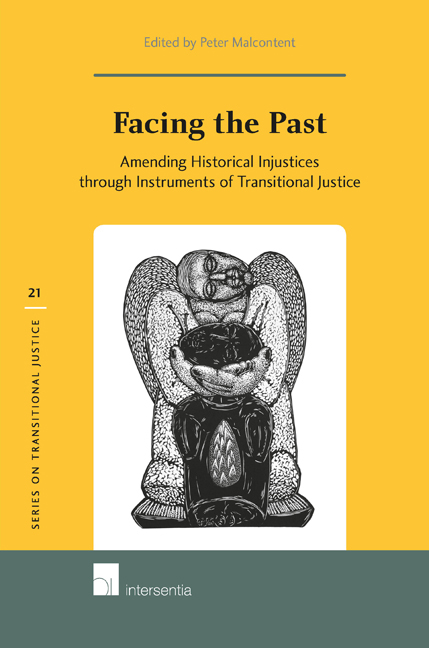Book contents
- Frontmatter
- Acknowledgements
- Contents
- PART I TRANSITIONAL JUSTICE. WHAT'S IN THE NAME?
- PART II RETRIBUTIVE JUSTICE
- PART III RESTORATIVE JUSTICE
- Introduction
- The Whole Truth and Nothing but the Truth? On the Role of Truth Commissions in Facing the Past
- Official Apologies
- Financial Compensation as a Political Process
- Education in the Shadow of History. Education, History Education, and Their Place in Historical Justice
- Governing through Repair. Historical Injustices and Indigenous Peoples in Canada
- PART IV PENDING CASES
- Author Information
Education in the Shadow of History. Education, History Education, and Their Place in Historical Justice
from PART III - RESTORATIVE JUSTICE
Published online by Cambridge University Press: 15 December 2017
- Frontmatter
- Acknowledgements
- Contents
- PART I TRANSITIONAL JUSTICE. WHAT'S IN THE NAME?
- PART II RETRIBUTIVE JUSTICE
- PART III RESTORATIVE JUSTICE
- Introduction
- The Whole Truth and Nothing but the Truth? On the Role of Truth Commissions in Facing the Past
- Official Apologies
- Financial Compensation as a Political Process
- Education in the Shadow of History. Education, History Education, and Their Place in Historical Justice
- Governing through Repair. Historical Injustices and Indigenous Peoples in Canada
- PART IV PENDING CASES
- Author Information
Summary
INTRODUCTION
Although our understanding of the differing forms of repair for grave historical injustices continues to grow, education still does not figure prominently on the list of available remedies. Arguments for considering history education reform as a form of historical justice and a force for reconciliation have been made over the last decade – including by myself. The calls for history reform, however, generally focus on the content of history education, most often history textbooks.
The idea that what is taught about other groups in national history textbooks (and, to a lesser extent, geography and literature textbooks) can be a cause of intergroup hatred and war dates back to just after World War I. Efforts to start an international organisation dedicated to analysing history textbooks and making recommendations for their reform led to the founding of the Georg Eckert Institute in Germany after World War II, and the formation of various bilateral commissions in Europe to do research on contested historical issues, publish their findings and then analyse and reform history textbooks. The reform of history textbooks to remove stereotypes and gross inaccuracies was an integral part of building peace and regionalisation in post-war Western Europe, as well as of the rehabilitation of (West) Germany and its process of public reckoning with the past beginning in the 1960s.
In addition to calls by entrepreneurs of justice and reconciliation to make history education content reform part of reckoning with difficult pasts, there are more poignant calls not to forget school-based education in the search for justice, which lend legitimacy to the history education-justice-reconciliation nexus. This call comes from victims/survivors and their advocates in many parts of the world: even more commonly heard than calls for violent revenge – surprisingly – are requests from victims, or their descendants, that governments ‘convey the historical fact to the younger generation’. In this way survivors express their belief that it is morally important to include both the injustices themselves and also the histories of the victims and their contributions within the nation's history. A sampling includes the following.
- Type
- Chapter
- Information
- Facing the PastAmending Historical Injustices Through Instruments of Transitional Justice, pp. 285 - 302Publisher: IntersentiaPrint publication year: 2016



